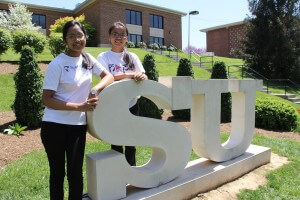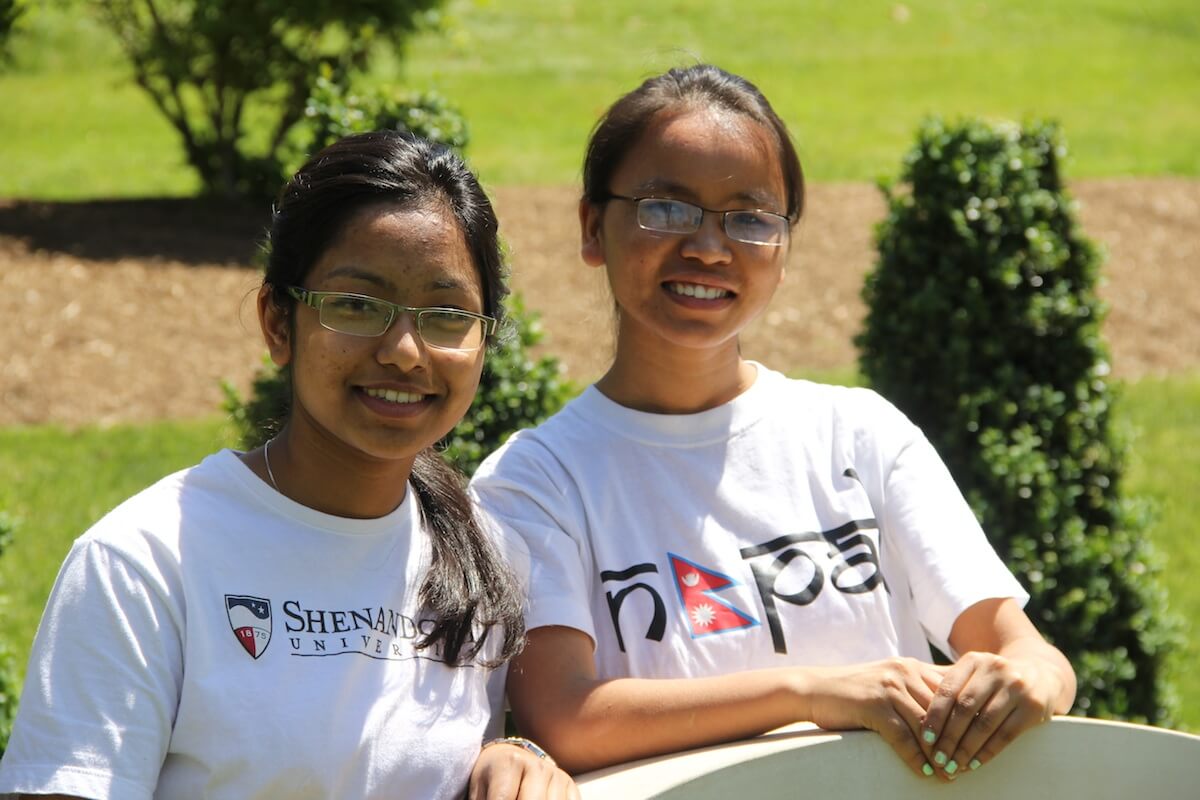If not for an education, the lives of two young Nepali women would be completely different. Sophomores Kriti Hada (above, left) and Sapana Ojha (above, right), both from Nepal, have overcome great personal obstacles and challenges to pursue their education and a better life.
The two began their studies at Shenandoah University in the fall of 2013 as scholarship recipients chosen during the March 2013 Global Citizenship Project (GCP) trip to Nepal. The original plan was to award a scholarship to one student, but university leaders felt both were deserving and found a way to fund both educations.
Hada, from Bhaktapur, and Ojha, from Kathmandu, were brought to Shenandoah’s attention through the university’s connection with the Little Sisters Fund. According to its website, the organization provides long-term scholarships for economically disadvantaged girls in Asia—girls who, without the educational support of the Little Sisters Fund, would be many times more susceptible to the evils of child labor, marriage and trafficking (including the international sex industry).
The Little Sisters Fund assisted both Hada and Ojha in their educational endeavors in Nepal, awarding them scholarships to continue their schooling. Hada joined the organization in fifth grade and Ojha in eighth grade.
The Selection Process
 Hada was torn about interviewing for a place at Shenandoah because she was already halfway through her university studies as an engineering student in Nepal. She decided it was worth a shot and threw her hat in the ring. Her interview went well, but she had to skip a group dinner later that night because she had to head home and study for an exam the next day.
Hada was torn about interviewing for a place at Shenandoah because she was already halfway through her university studies as an engineering student in Nepal. She decided it was worth a shot and threw her hat in the ring. Her interview went well, but she had to skip a group dinner later that night because she had to head home and study for an exam the next day.
“I was at home studying, and I was so tense about my exam. A Little Sisters Fund staff member called me and said [President] Tracy [Fitzsimmons] wanted to talk to me. Tracy said she wanted me to come to Shenandoah. I went upstairs to tell my sisters, and they were all so excited for me that they were crying.”
At first, Ojha wasn’t sure if she should apply. “I thought, ‘Me, in the United States? Is this possible?’ Because I’m the only one in my family who finished high school.”
But on the day of her interview, she knew she made the right choice to apply. “When their whole group got out of the van, wearing their white Shenandoah T-shirts, and Tracy was in front of them smiling, I thought, ‘I want to go there. I want to be at Shenandoah.’ It was an amazing feeling.”
Her interview was nothing like she was expecting. “I thought there would be some big person—maybe an American man. But the three ladies who interviewed me were so polite, and I just wanted to keep talking to them.”
After a group dinner that evening, the suspense was killing Ojha. She wanted to know if she had made the cut. “I remember the moon was so bright that night. We were outside, and I heard Tracy announce my name. I was so happy I just cried. Everyone cried, I think. I assured everyone I was crying because of this opportunity. It was the happiest cry ever.”
The Long Road to College
However, to get to the point of college acceptance was a long journey for both students. Hada and Ojha each lost their fathers at a young age, and as a result, their families struggled to make ends meet.
Hada’s father was diagnosed with cancer, and he passed away when she was in the seventh grade, leaving behind Hada, her mother and three older sisters.
“At that time, all of us were in school. We didn’t have anything, because our father was the only income for us. My sister was about to complete her university, but she had to sacrifice her own studies in order to work. That’s one of the reasons she’s not in graduate school. But the good thing was that Little Sisters Fund was there for me. If it wasn’t for their support, my direction of life would have been very different.”
Hada says if she would have ended her schooling when her father died, life would have been very hard for her. “I would have had to drop out of school and give less time to education—that would have impacted me in a big way.” She says that the most common jobs for uneducated girls in Nepal are usually sewing and knitting or housework jobs.
Ojha, who has two sisters, witnessed the struggles her parents had with alcohol abuse. Her father died when she was in the fourth grade.
“It was hard for me when my father died. I paid for my education by myself, up to the eighth grade. My two sisters and I worked in a wool factory for our main source of income. My teachers knew that I was having a hard time paying for my education, so Little Sisters Fund stepped in to help.”
If it wasn’t for the Little Sisters Fund, “my life would have completely stopped,” said Ojha. “Many of my friends are married and have two or three children already. Without education, most of the girls get married. A girl earning money herself and living a single life is very hard—they have to depend on other people. I’m sure without Little Sisters Fund I would have stopped my education after the 10th grade and my life would be completely different.”
A New Shenandoah “Family”
“I like being at Shenandoah because I feel like part of a family,” said Ojha. “Shenandoah doesn’t feel like a university—it feels like a small, close family.” Hada echoed those sentiments, saying, “The thing I like about Shenandoah is that it is a small school and the teachers know you very well. The people here are really friendly.
“Since Shenandoah is a small school, it’s easy to get to know each other,” she added. “I can talk about my problems with anyone. One of the good parts is that students and staff are always ready to help you.”
Ojha was surprised at the difference in class schedules between Shenandoah and her school in Nepal. She didn’t realize she’d move between buildings for classes and have breaks throughout the day.
In Nepal, classes were continuous and teachers came to the students instead of students traveling to and from different classes. Night classes offered one day per week were unheard of. “Sometimes at night my family calls from home, and they’re surprised when I say I’m in class. Yes, I tell them—it’s 9 p.m. and I’m in class,” she chuckled.
Ojha also noticed a big difference when interacting with professors at the university. “In Nepal, we felt afraid to go to the teacher if we had questions. So I did everything by myself. If I did not understand something, I went to a book in the library and found the solution. But the teachers here at Shenandoah are so helpful.”
Both students have enjoyed exploring the nature that surrounds Shenandoah University. “I’ve gone caving and hiking with SU Outdoors,” said Hada. “Those moments are the most memorable ones because Shenandoah helped me to explore the Shenandoah Valley. That was a great experience for me.”
“When we went to visit Harper’s Ferry during orientation, I loved seeing the river and the mountains,” said Ojha. “It reminded me of the natural beauty of Nepal.”
Looking Toward the Future
Because a great number of people and organizations have helped the students toward their current success, both Hada and Ojha feel drawn to give back to those in need.
“I want to impact people’s lives, and being a nurse, I know that I can impact at least one person each day,” said Ojha. “I want to do something for my country. They are sleeping, and I want to make them wake up. I have a dream to lead my country. Women in Nepal, they have many female problems, and they don’t go to the doctor for regular checkups. So, I want to take care of them and educate them about women’s health. I want to make a difference in the health sector.”
“I’m so grateful to Little Sisters Fund, and because of that, I want to help people,” said Hada. “I have seen the impact of the program, and I think that we need more helping hands like those organizations to affect change in countries like Nepal. I really want to work with the United Nations someday and am thinking about going into nursing or working in oncology. I want to help change lives.”
“In Nepali society, it’s a son preference,” said Hada. “So, all of our relatives and others in society questioned my father about why he was educating my sisters and me. But he always said, ‘My daughters are going to be great and make me proud. They are going to be the stars of the nation.’ With that passion from my father, and all he did for us, I feel I have to do something.”
— Emily Burner




